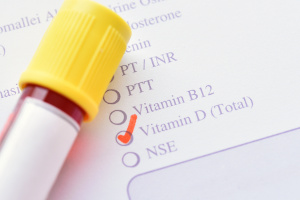Healthy vitamin D levels protect against cancer
 Having sufficient vitamin D in your blood protects you against several cancer forms, according to a new review article that is published in Seminars in Cancer Biology. The summer sun is our primary source of the vitamin, but we can only store a limited amount in the liver for the winter period. The problem is made worse by the fact that we spend too much time indoors, and ageing even increases the risk of chronic vitamin D deficiency. The question is how much vitamin D do we need to protect us against cancer?
Having sufficient vitamin D in your blood protects you against several cancer forms, according to a new review article that is published in Seminars in Cancer Biology. The summer sun is our primary source of the vitamin, but we can only store a limited amount in the liver for the winter period. The problem is made worse by the fact that we spend too much time indoors, and ageing even increases the risk of chronic vitamin D deficiency. The question is how much vitamin D do we need to protect us against cancer?
Cancer is a broad term for diseases with uncontrolled, malignant cell growth. In many cases, years can pass from the time the first cell begins to change to it develops into a tumor. The body mechanisms designed to eliminate diseased cells are also deactivated. Over time, the cancer cells are able to spread by way of the bloodstream and lymph channels so they can metastasize and become life-threatening. Although screening methods and therapies have improved, the cancer rate is still going up, and Denmark holds a number of tragic records.
Even among people who stick with the official dietary guidelines, maintain their ideal weight, limit their alcohol intake, make sure to exercise, and avoid smoking, there are many who get cancer. Interestingly, evidence points to vitamin D deficiency as an overlooked factor.
|
Vitamin D has several ways of protecting against various cancer forms
Vitamin D is important for bones, muscles, the immune defense, and cell division. Most of the cells in the body have vitamin D receptors (VDR) that control around 5-10 percent of our genes by means of on-off switches. In the review article that is published in Seminars in Cancer Biology, the authors explain how vitamin D activates several parts of the immune defense and contributes to the prevention of chronic inflammation, which is the common thread in a number of diseases, cancer included.
According to the review article, vitamin D has the greatest preventative impact on colon cancer and leukemia, lymphoma and other types of blood cancer. Vitamin D therefore plays a vital role for stem cells and for the regeneration of tissues such as intestinal tissue and skin tissue.
But with too little vitamin D there is a risk that the cells’ vitamin D receptors fail to function optimally and the cells start to divide uncontrollably.
Scientists have also observed that low vitamin D levels in the blood increase the risk of breast cancer and prostate cancer and that it may worsen the prognosis.
The authors, however, mention that vitamin D supplementation has not been able reduce cancer mortality in controlled studies and therefore suggest that vitamin D supplements should be used to accommodate individual needs. It is also important to take the right dose to obtain the optimal effect, and it is similarly important to begin vitamin D supplementation sufficiently early because it takes many years for cancer to develop.
A large meta-analysis carried out by scientists from Michigan State University has looked at nearly 80,000 cancer patients that took vitamin D or a placebo for a period of three years. The researchers found a statistically significant difference in mortality between the two groups. It may therefore be important to include vitamin D as part of the treatment.
Official recommendations and the real need for vitamin D
The reference intake (RI) level for vitamin D for white adults up to the age of 70 years is 5 micrograms. The Danish Health Authority recommends daily supplementation with 10 micrograms for pregnant women, infants, people with dark skin, and people who get too little sunlight. A daily 20-microgram supplement is recommended for nursing home residents and people older than 70.
New studies show that overweight individuals and diabetics have an increased need for vitamin D. The same goes for people who take cholesterol-lowering medicine (statins). Many researchers even claim that the actual need for vitamin D is much higher than the RI levels. More precisely, they recommend between 30 and 100 micrograms daily to optimize blood levels of the nutrient. Humans can easily synthesize that amount from sun exposure on a warm summer’s day. However, because our liver can only store a limited quantity of vitamin D, people living at northern latitudes are advised to take a vitamin D supplement during the winter period.
|
References
Carsten Carlberg, Alberto Munoz. An update on vitamin D signaling and cancer. Seminars in Cancer Biology. 2020
University of Eastern Finland. A good vitamin D status can protect against cancer. ScienceDaily. June 10 2020
Varun Samji et al. Role of vitamin D supplementation for primary prevention of cancer: Meta-analysis of randomized trials. Journal of Clinical Oncology, 2019
Michigan State University. Vitamin D could help cancer patients live longer. ScienceDaily. June 2019
Obesity and vitamin D deficiency may indicate greater risk for breast cancer. Cleveland OH: The North American Menopause Society. September 19, 2018
https://www.dst.dk/da/Statistik/bagtal/2018/2018-10-24-Danskere-doer-oftere-af-kraeft-end-vores-naboer
Search for more information...
- Created on .








